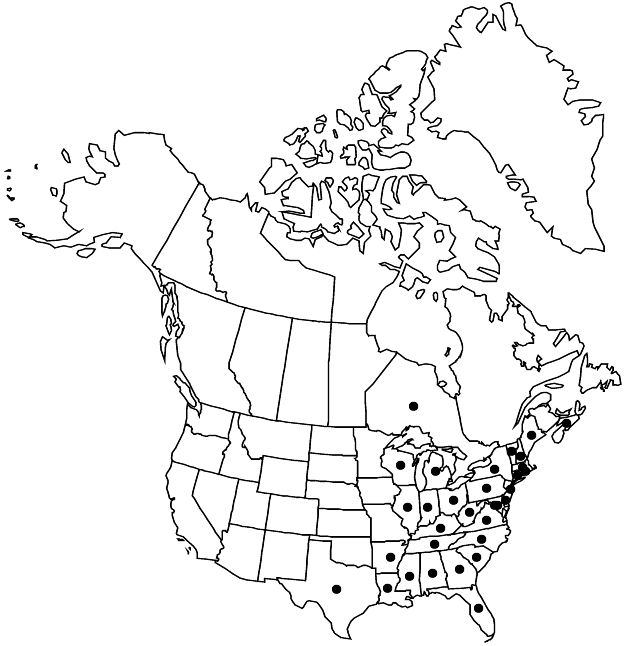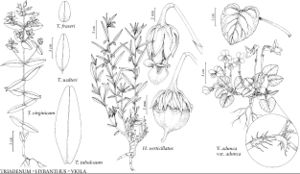Difference between revisions of "Triadenum virginicum"
Fl. Tellur. 3: 79. 1837.
FNA>Volume Importer |
FNA>Volume Importer |
||
| Line 22: | Line 22: | ||
|name=Elodes campanulata | |name=Elodes campanulata | ||
|authority=(Walter) Pursh | |authority=(Walter) Pursh | ||
| − | }}{{Treatment/ID/Synonym | + | }} {{Treatment/ID/Synonym |
|name=E. campanulata var. emarginata | |name=E. campanulata var. emarginata | ||
|authority=(Lamarck) Pursh | |authority=(Lamarck) Pursh | ||
| − | }}{{Treatment/ID/Synonym | + | }} {{Treatment/ID/Synonym |
|name=E. virginica | |name=E. virginica | ||
|authority=(Linnaeus) Farwell | |authority=(Linnaeus) Farwell | ||
| − | }}{{Treatment/ID/Synonym | + | }} {{Treatment/ID/Synonym |
|name=Gardenia virginica | |name=Gardenia virginica | ||
|authority=Walter | |authority=Walter | ||
| − | }}{{Treatment/ID/Synonym | + | }} {{Treatment/ID/Synonym |
|name=Hypericum campanulatum | |name=Hypericum campanulatum | ||
|authority=Stokes | |authority=Stokes | ||
| − | }}{{Treatment/ID/Synonym | + | }} {{Treatment/ID/Synonym |
|name=H. enneandrum | |name=H. enneandrum | ||
|authority=(Walter) Sprengel | |authority=(Walter) Sprengel | ||
| − | }}{{Treatment/ID/Synonym | + | }} {{Treatment/ID/Synonym |
|name=Martia campanulata | |name=Martia campanulata | ||
|authority=unknown | |authority=unknown | ||
| Line 55: | Line 55: | ||
|elevation=0–500 m | |elevation=0–500 m | ||
|distribution=N.S.;Ont.;Ala.;Ark.;Conn.;Del.;D.C.;Fla.;Ga.;Ill.;Ind.;Ky.;La.;Maine;Md.;Mass.;Mich.;Miss.;N.H.;N.J.;N.Y.;N.C.;Ohio;Pa.;R.I.;S.C.;Tenn.;Tex.;Vt.;Va.;W.Va.;Wis. | |distribution=N.S.;Ont.;Ala.;Ark.;Conn.;Del.;D.C.;Fla.;Ga.;Ill.;Ind.;Ky.;La.;Maine;Md.;Mass.;Mich.;Miss.;N.H.;N.J.;N.Y.;N.C.;Ohio;Pa.;R.I.;S.C.;Tenn.;Tex.;Vt.;Va.;W.Va.;Wis. | ||
| − | |discussion=<p>Triadenum virginicum is the most widely distributed North American species of Triadenum. In the southwestern part of its range, the leaves are longer and narrower, approaching those of T. tubulosum and T. walteri; it is nearly always distinguishable from the northern T. fraseri by the sepals and styles (see key).</p> | + | |discussion=<p><i>Triadenum virginicum</i> is the most widely distributed North American species of <i>Triadenum</i>. In the southwestern part of its range, the leaves are longer and narrower, approaching those of <i>T. tubulosum</i> and <i>T. walteri</i>; it is nearly always distinguishable from the northern <i>T. fraseri</i> by the sepals and styles (see key).</p> |
|tables= | |tables= | ||
|references= | |references= | ||
| Line 79: | Line 79: | ||
|publication year=1837 | |publication year=1837 | ||
|special status=Endemic;Selected by author to be illustrated | |special status=Endemic;Selected by author to be illustrated | ||
| − | |source xml=https://jpend@bitbucket.org/aafc-mbb/fna-data-curation.git/src/ | + | |source xml=https://jpend@bitbucket.org/aafc-mbb/fna-data-curation.git/src/8f726806613d60c220dc4493de13607dd3150896/coarse_grained_fna_xml/V6/V6_182.xml |
|genus=Triadenum | |genus=Triadenum | ||
|species=Triadenum virginicum | |species=Triadenum virginicum | ||
Revision as of 18:46, 18 September 2019
Herbs erect, 2–7 dm, sometimes with ascending branches distally. Stems: internodes 4-lined or 4-angled at first, then terete. Leaves sessile, sometimes amplexicaul; blade usually ovate or triangular-ovate to elliptic or oblong, rarely oblanceolate, 20–65 × 10–22(–30) mm, base shallowly cordate, apex usually rounded, rarely obtuse to retuse, gland dots laminar (relatively dense, large) and intramarginal (relatively small). Inflorescences laxly cylindric to pyramidal, 3–15-flowered from terminal node, sometimes with subsidiary inflorescences from to 4 proximal nodes and flowering branches from to 6 further nodes. Flowers 10–15 mm diam.; sepals oblong to elliptic-oblong or oblong-lanceolate, 4–7(–8) × 1–2 mm, apex acute to acuminate; petals oblong-elliptic to oblanceolate, 6–9(–10) mm; stamen fascicles 4–6.5 mm; filaments 1/5 connate; styles 2–3.5 mm. Capsules cylindric to ellipsoid or ovoid-ellipsoid, (8–)9–10(–12) × 4–5 mm, apex acute. Seeds 0.5–1.2 mm. 2n = 38.
Phenology: Flowering summer–fall (Jul–Oct).
Habitat: Swamps, marshy shores, poor fens
Elevation: 0–500 m
Distribution

N.S., Ont., Ala., Ark., Conn., Del., D.C., Fla., Ga., Ill., Ind., Ky., La., Maine, Md., Mass., Mich., Miss., N.H., N.J., N.Y., N.C., Ohio, Pa., R.I., S.C., Tenn., Tex., Vt., Va., W.Va., Wis.
Discussion
Triadenum virginicum is the most widely distributed North American species of Triadenum. In the southwestern part of its range, the leaves are longer and narrower, approaching those of T. tubulosum and T. walteri; it is nearly always distinguishable from the northern T. fraseri by the sepals and styles (see key).
Selected References
None.
